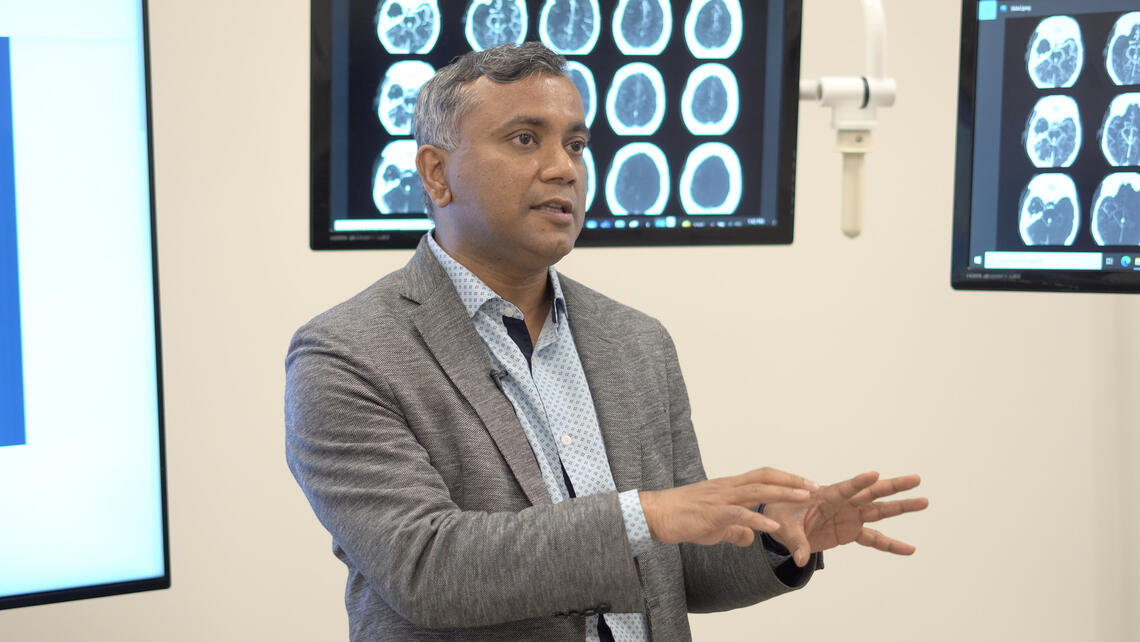Dec. 16, 2024
New clinical trial begins in Calgary to improve stroke care in Canada

You’ve had an ischemic stroke, the most common form of stroke. A blockage or clot is stopping blood flow in your brain and cells are dying. Your care team has determined the best treatment for you is an endovascular procedure where the clot will be plucked out to return blood flow. You’ve received a clot-busting drug. Should your treatment plan include anything else?
A University of Calgary researcher is leading a national study investigating whether a new drug could protect brain cells and reduce neurological disability.
“When you have an ischemic stroke, every second is critical because every second blood isn’t flowing, more brain cells are dying,” says Dr. Bijoy Menon, MD, neurologist, professor at the Cumming School of Medicine (CSM) and principal investigator. “We are investigating whether a neurological protectant, NoNO42, should be given to patients in addition to the current standard of care.”
Recruitment for the trial is already underway in Calgary. Across Canada, the trial will include up to 600 patients in as many as 15 hospitals. Half of the patients will receive the standard of care and the neuroprotectant. The other half will receive the standard of care and a placebo. The study will be double blind. That means no one on the care team will know who has been selected for the neuroprotectant. Patients will receive two follow up calls, at 30 and 90 days, to see how they are doing.
The research study is supported by the Canadian Institutes of Health Research (CIHR) Clinical Trials Fund.
“CIHR is proud to support this clinical trial testing a ground-breaking treatment to protect people living in Canada from significant threat from stroke,” says Dr. Tammy Clifford, PhD, acting president, the Canadian Institutes of Health Research. “I am eager to see where this trial will lead.”
The study builds on research in the AcT Trial. Research in that trial revealed Tenecteplase (TNK), a safe, well-tolerated drug commonly used as a clot buster for heart attacks, is an effective treatment for acute ischemic stroke. The findings published in The Lancet changed practise guidelines in Canada.
Heart and Stroke estimates that in Canada someone has a stroke every five minutes, and while more Canadians are surviving stroke, it remains the leading cause of disability.
“The goal for this study is to discover whether neuroprotection works. Having this as an option would be a fundamental change in how we treat stroke and could improve outcomes substantially for these patients,” says Menon.
Menon says getting the trial off the ground quickly in Calgary is thanks to the dedicated team that includes Craig Doram, director of business operations, Carol Kenney, global lead clinical trial nurse co-ordinator, and Qiao Zhang, the global lead clinical trial manager. The group operates within the Calgary Stroke Program, a collaboration between the Department of Clinical Neurosciences and Hotchkiss Brain Institute at the CSM, and Alberta Health Services.
“Research of this nature is a team effort. The operations and nursing team work closely with the physicians from the beginning when we apply for grants – the trial protocols and interactions with our study participants and their families,” says Menon.

Bijoy Menon says the goal of the study is to find out whether a neuroprotective drug could save some brain cells from dying during an ischemic stroke.
University of Calgary
Bijoy Menon is a professor in the departments of Clinical Neurosciences, Radiology, and Community Health Sciences at the Cumming School of Medicine (CSM) and lead, Neuro Stroke team at the Hotchkiss Brain Institute at the CSM. He is a neurologist at the Foothills Medical Centre, Alberta Health Services.




